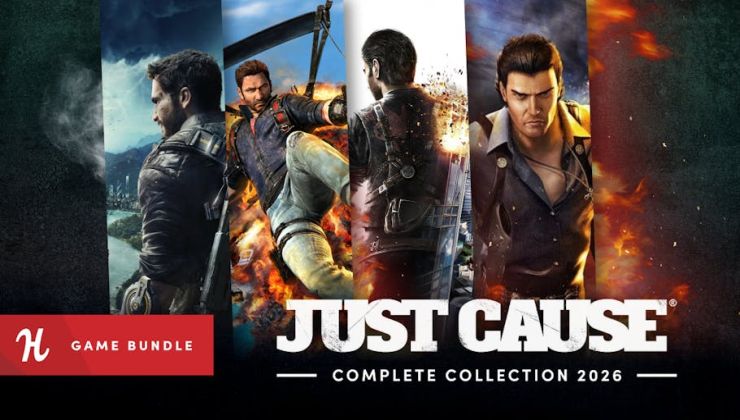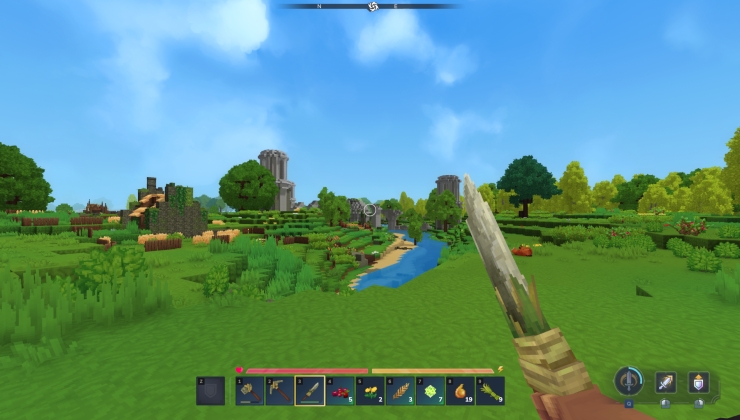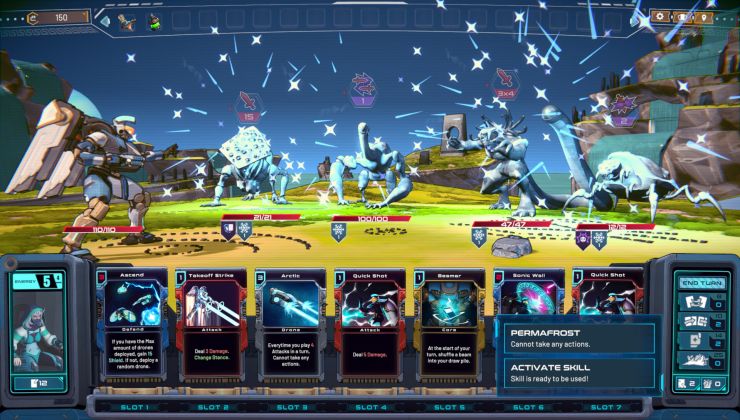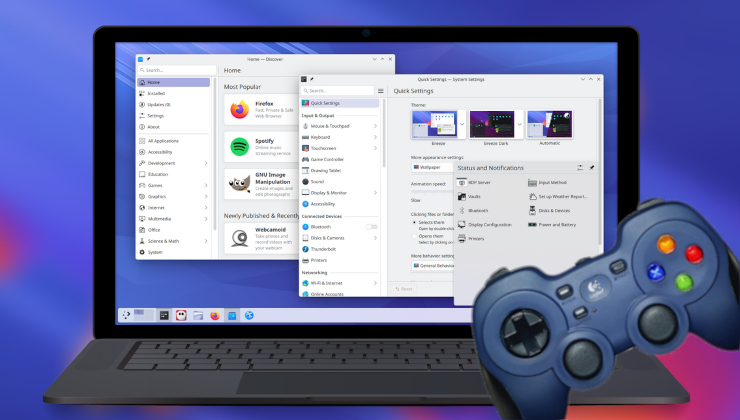Rebel Galaxy Outlaw is a fantastic open-world space game but Rebel Galaxy Outlaw has a terrible Steam reviews score. Are Steam reviews making us miss out on good games?
Linux gamers on Steam have a particularly close relationship with the Steam community. Before the days of ProtonDB it was Steam reviews and discussion pages where we would find out how well the game ran on Linux (excepting, of course, this publication). We also may be the most outspoken minority on Steam. Think of the obligatory "Will this come to linux?" Steam discussion post. We should be proud that our feedback can be especially helpful to developers.
There are tireless Linux gamers dedicated to producing Steam reviews with Linux in mind (check out cbones, Houtworm, and the GamingOnLinux Steam group). However, I have come to realize that my faith in Steam reviews may have come at a cost, and perhaps you will to. Think of a game that you love and believe most gamers should love, but which has an incomprehensibly poor rating on Steam. If you came up with one, we share something. If you can't think of one, sort your Steam library by Steam review and take a look near the bottom to see what you can find. This article is about Rebel Galaxy Outlaw, its 'Mixed' steam rating, and the system of Steam reviews upon which many of us rely.

You can sort your Steam library by rating to find games you have played with poor ratings.
Rebel Galaxy Outlaw (RGO) is the sequel to the indie hit Rebel Galaxy and a spiritual successor to the Privateer franchise. It's an open world space game with light simulation elements and an old-school Western feel that plays great on my aging Geforce 1070 via Proton at 4K with maxed settings. There are some reports on ProtonDB that you need to install mfc42 from Protontricks, with GE-Proton7-30 I did not need to.
We play as Juno, a cynical spacer down on her luck, on a meandering adventure through Dodge Sector: a collection of stellar systems replete with various unsavoury characters, most of whom speak in a distinctly Deep South accent. Firefly is clearly a source of inspiration. You can fly trade routes, mine asteroids, take mercenary contracts, bounty hunt, smuggle contraband, and rob traders blind at gunpoint. The visual aesthetic is a delightful oversaturated kaleidoscope. It's well optimized and runs buttery smooth. The combat is smooth and satisfying. The writing and voice acting bounces between well-done and superb. It has a simulated economy with random events and fluctuating prices. It has an embedded GIMP-like application for custom ship paintjobs. It has space station bars where you can play full-fledged minigames of dice-poker, 8-ball, slots, and Asteroids. You can flip twin birds to your enemies from inside your cockpit. It has the best licensed soundtrack of any game I have ever played, spread over seven different radio stations.

Direct Link
Content warning: Watch Juno rob innocent traders, destroy dastardly pirates, and sometimes both at once. Cringe as Juno fails at Asteroids on an arcade cabinet. One very mild story spoiler.
And yet despite all this, RGO has a resoundingly 'Mixed' rating from gamers on Steam. No review bombs, no political brigading, no glaring technical issues or mentions of Epic exclusivity, just gamers that don't recommend RGO to their peers. The complaints in negative reviews vary wildly; the game is too different from the original, the controls are poor, the game is repetitive, too difficult, or too simple. It's tough to pin down what gamers didn't like. The gaming press, on the other hand, liked RGO considerably more. On OpenCritic, 84% of critics recommend the game, with an average score of 77%.
There are plenty of criticisms in the Steam reviews that I agree with. The mouse and keyboard controls are not great (I play with a Steam Controller). There isn't the same amount of content as games like Elite; I'm 20 hour in to the game and I'm starting to upgrade to what I suspect is the highest equipment tier. The main story, while good, is spread a little thin. But given the positives, none of these complaints should be death-knells to a 30$ USD game that regularly goes on sale for 6$ USD. The mismatch between RGO's Steam rating and its positive qualities simply doesn't make sense. And what if RGO is not a one-off case, but one of countless games unjustly ignored because of poor Steam reviews?

Privateer fans will feel right at home in the cockpit view
The wisdom of crowds is the idea that the Law of Large Numbers from statistics can be applied to people's individual decisions. It roughly states that given a large number of independent assessments, the mean of those assessments will be correct. To the (albeit limited) extent that the quality of a game is objective, one is tempted to take Steam reviews very seriously indeed; after all, regular gamers are probably less likely than journalists to be influenced by each other (independence) and there are a lot of gamers writing steam reviews (large numbers).
For me, Steam reviews have been something close to gospel. An 'Overwhelmingly Positive' score is nearly an automatic wishlist. My brain translates a 'Mostly Positive' into 'Move Past', and a 'Mixed' into 'Melanoma'. There are benefits to this extreme faith in Steam reviews. If you play and browse through a lot of games it's difficult to investigate each game thoroughly, and a Steam review score offers a simple heuristic for whether to linger on a game's store page or move on. However, since discovering how fantastic RGO is, I'm haunted by the idea that I've been missing out.
 A user-created paintjob for one of the ships in RGO, turning their cargo hauler into a mobile whiskey distillery for the premier in-game whiskey brand.
A user-created paintjob for one of the ships in RGO, turning their cargo hauler into a mobile whiskey distillery for the premier in-game whiskey brand.
Steam reviews are also a mixed bag for developers. For better or worse, Steam reviews make developers more responsive to the reviewer feedback. As the average gamer has more conservative taste than your average journalist, the Steam review system may makes developers more cautious when experimenting. The Steam review system likely favours lower-spec gamers and smaller gamer communities (like ours) compared with mainstream gaming journalism. A positive rating can be especially useful with smaller titles that don't have a lot of attention from gamer press or content creators. There are also unambiguous drawbacks to Steam reviews: buyers are more likely to complain than praise, trolling/brigading, out-of-date Early Access reviews, and the high playtime negative reviews (for bad reasons), to name a few.

A couple of Elite: Dangerous reviews. One complains about the entirely optional multiplayer gamemode, the other is too busy playing Elite to elaborate.
Well, what's the solution? How do we as gamers balance the tempting simplicity of the Steam reviews system with its drawbacks, and the possibility of missing out on gems? Perhaps as you have guessed, there is no simple answer. All we can do is be aware of the limitations of the Steam review system and adjust our own mental processes accordingly. Personally, I will keep using Steam reviews as a useful tool in deciding how much time to spend looking into a game, but finding RGO has left me humbled. Now my brain reads 'Mixed' as 'Maybe another Rebel Galaxy Outlaw'. Which isn't all that bad; if the cost to finding another RGO is moving a little slower through my discovery queue, I think it's a fair trade.
Addendum: The only other game I own with a 'Mixed' rating that I loved is Amnesia: A Machine for Pigs, but there I at least understand the Mixed rating: people wanted a horror game and got a walking simulator. I'm curious to hear what other people come up with.
The reviews themselves are immensely useful, I don't really care about the score but reading users comments about things like terrible controls or lack of developer support is extremely valuable. I prefer to form my own opinion, but I'm likely to pass on a game when the reviews are scathing and based in reality.
Look at Steam green light, it was awesome in theory: the community curate the content that will reach the store, and the developer don't need to spend money. The reality: a lot of amazing titles stayed on the limbo, while the community keep pushing meme games. Result: valve removed greenlight, now the dev need to put money and any game goes to the store. So we have good games but there's no filter, every day a ton of trash published.
Valve keep trying: the curatory system doesn't work too, the timeline system is helpful to identify review bombing but still don't fix anything - I mean, a review bomb can be valid, and some reviews "out of the bubble" will be ignored.
When I want some game, I simply look for videos on YouTube and look for a reviewer that I agree most of the time.
When I see that a game are injusticed on steam, I leave a small review to help
Addendum: The only other game I own with a 'Mixed' rating that I loved is Amnesia: A Machine for Pigs, but there I at least understand the Mixed rating: people wanted a horror game and got a walking simulator.This is the key point. A game with a high review score isn't saying "this is a good game," it's saying "the Store description accurately describes the experience of playing the game." When that description is accurate everyone that wouldn't like that kind of game doesn't buy it, and the people that do buy it are the ones that would like it.
Last edited by CatKiller on 16 Sep 2022 at 12:05 pm UTC
As for Steam reviews, they are about as worthwhile as user reviews on metacritic or some such. A lot of people try to put in the work, but a lot are barely literate and often try to push the agenda of the hour.
Last edited by damarrin on 16 Sep 2022 at 12:12 pm UTC
Rebel Galaxy Outlaw is a fantastic open-world space game100% agreed with this statement, I enjoyed it immensely.
Quoting: dpanterThe review score is more what you'd call 'guidelines' than actual rules.I take the same sort of approach. No matter the review rating I will still read through the reviews to get a flavour for myself. It's something I've also always done with general "shopping site" reviews, as something rated really well could actually be revealed to be a gamble after reading the more negative reviews (which can often give useful insights).
The reviews themselves are immensely useful, I don't really care about the score but reading users comments about things like terrible controls or lack of developer support is extremely valuable. I prefer to form my own opinion, but I'm likely to pass on a game when the reviews are scathing and based in reality.
I may be overly cautious buying stuff but then again I don't have a money tree in the garden!
Last edited by fabertawe on 16 Sep 2022 at 1:05 pm UTC
The thumbs up/down is still a bit of a problem though. It works polarising as is the case with many such systems. A neutral option would go a long way in mitigating that.
It's one of the biggest issues to solve in internet imo.
In my case, the solution is pretty simple: I read at least a few of the reviews (the exact number depends on how invested I am in potentially buying the game) and I try to get a feel for WHY the people who don't like the game feel so; also, I try to spot the reviews that feel like they've been written by people closer to my tastes/mindset/expectations and then take those more seriously than the rest.
E.g., even if this particular game has Mixed reviews on Steam and a 3.4 on GOG, if I generally like the way you think and believe our tastes match, then I'm more inclined to buy it based on your opinion; and the same goes for negative reviews.
But it's understandable that for you, spending a couple of hours reading reviews for each new game you want to buy may not be exactly feasible.
Quoting: NociferI think this problem is more down to you being a gamer by profession (~ish) who owns a gaming site that among other things forces you to go through more games in less time than most of the rest of us.I think you're a little confused on who wrote this, it wasn't me :P
1. mostly ignore the positive reviews, maybe read one or two of the longer ones.
2. read a few negative reviews and decide if the issues they mention would be issues for me as well
The overall score may or may not influence my decision, but it's true that it serves as a preliminary filter most of the time.
If you're not puting any critical thought into the Steam review within the context of the game and it's target audience, I'm sorry, that's your fault, not Valve's. A decent niche game targeting a niche audience is probably going to have a higher score than a decent niche game targeting a general audience, for example. It's no different than press reviews. I don't think it will shock anyone that a strategy gaming site might review a rough, but good strategy game differently than a main stream site.
Either way, I'm glad you like the game. As a privateer fan, I'm gonna check it out based on your recommendation.
Ps... I would be really interested in an article about the abuse of the review system. I'd think a larger issue would be the "bored player", trolling, brigades, like you mentioned. I'm curious how much different devs fret about it and how it effects their choices.
Last edited by Bogomips on 16 Sep 2022 at 2:45 pm UTC
Speaking about the balancing act of the review system, I have a counter example: when some game receiving a mixed rating is "not enough" for me. In one particular instance the developer never delivered on his promises, abandoned the game in an alpha state and moved on to the next game, leaving the unofficial modders to pick up the slack. It seems that this "was enough" in the end, because he stopped producing games, but at the cost of three abandoned titles with broken promises, forum bans and constant backpedaling. Not naming any names, I'm sure the developer got his fill of harassment (with or without quotation marks) online.
And speaking about injustices: I can't get out of my head the sad story of Star Ruler 2 developers. It was not an easy game to jump into, because they innovated on the 4x/grand strategy formula and made a bunch of systems and game mechanics that were never seen in this genre as far as I know. And once it clicked, it was (and still is) the best game that I've played in this genre. Years later Stellaris showed the world how popular realtime 4x can be, but it was very late, because the indie studio that made Star Ruler 2 was closed already. They said that the press was not interested and many people didn't know what to make of it, partly because it was straying far away from the established formula, despite some very glowing reviews by established reviewers at the time. They made their custom game engine in C (!!!) with heavy scalability and multithreading in mind (and native linux support), they made one DLC after that, went broke and was struggling for a job for a long time. Open-sourced the game a couple of years after that, so you can check it... and maybe even help me install it, because I'm struggling with it for some reason.
Sorry if I got carried away with my writing, I hope that someone will find it at least a bit interesting.
Quoting: Liam Dawemaybe they watched the incredible dogfighting in that gameplay video and were calling me a pRo gAmEr?:wub:Quoting: NociferI think this problem is more down to you being a gamer by profession (~ish)I think you're a little confused on who wrote this, it wasn't me :P
Quoting: voxI can't get out of my head the sad story of Star Ruler 2 developers. It was not an easy game to jump into, because they innovated on the 4x/grand strategy formula and made a bunch of systems and game mechanics that were never seen in this genre as far as I know. And once it clicked, it was (and still is) the best game that I've played in this genre.wishlisted this, I like the genre and it looks like a lot of fun.
Got it on GoG so there is no Steam Input in that. It's a wild mix of virtual Gamepad (with MoltenGamepad) and AntimicroX to act as keyboard input. Works like a charm tho :grin:
There be video: [https://www.youtube.com/watch?v=QMyhMWcH5xo](https://www.youtube.com/watch?v=QMyhMWcH5xo)
InnerSpace 62%
https://store.steampowered.com/app/347000/InnerSpace/
The Signal From Tölva 70%
https://store.steampowered.com/app/457760/The_Signal_From_Tlva/
There are also a few that I feel are over-rated, but that is more about my taste and not necessarily a reflection on the game (like Shovel Knight).
Anyway, to me, the game is awful for one basic but extremely important point: the keyboard & mouse controls are a disaster. They made the game initially for PC but didn't gave a crap about making the default input method of playing games on PC (mouse and keyboard) to work properly. They focused on controller, because probably going console was their goal to begin with, ignoring the main concerns of the PC users about the issue. It was never fixed. Funny thing, going console didn't work for them either in the end. Greed is a funny business.
I love Privateer (and wing commander series overall) but even I disliked this game. The controls of the original are actually better.
Now compare this with Freespace or Freelancer. now that was proper kb & mouse support!












 How to setup OpenMW for modern Morrowind on Linux / SteamOS and Steam Deck
How to setup OpenMW for modern Morrowind on Linux / SteamOS and Steam Deck How to install Hollow Knight: Silksong mods on Linux, SteamOS and Steam Deck
How to install Hollow Knight: Silksong mods on Linux, SteamOS and Steam Deck